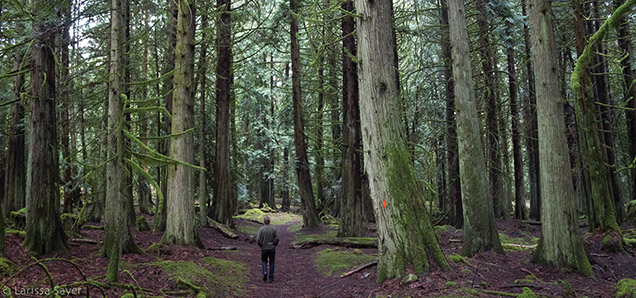Rumours of Grace: Wheels, gears and levers
 CREDIT: "YOUNG GIANTS" BY LARISSA SAYER ON FLICKR (CC BY-NC 2.0) / DESATURATED
CREDIT: "YOUNG GIANTS" BY LARISSA SAYER ON FLICKR (CC BY-NC 2.0) / DESATURATEDWhere have all the trees gone? In place of tall and mighty trees are buildings and machinery.
During a CBC interview one morning, a guest said that about half of the world’s electricity comes from coal. Apparently it is the dirtiest energy money can buy. Coal firing produces enormous amounts of carbon dioxide, which traps heat in our atmosphere. It is a major factor in global over-heating and in the Canadian energy picture.
The interviewee also said that there are about 7,000 coal-fired electric generating stations on the planet. While there is new technology being developed to remove 90 per cent of the carbon emissions from coal smoke, it is expensive, and the number of generating stations using it is extremely tiny. Not a comforting picture.
It gets worse.
The World Resource Institute’s website reveals that there are at the moment another 1,199 coal-fired generating plants being planned. It is likely that only a handful will install the new technology.
Admittedly, the author of The Hobbit and The Lord of the Rings (LOTR), J. R. R. Tolkien, was not a global warming expert or an engineer of energy systems. But the commentary included in the DVD extended version of The Two Towers (part two of LOTR) explores Tolkien’s distaste for modern minds, which are all about exploitation and development. He was critical of the modernist mind-set that plans infrastructures – such as coal burning plants – that destroy.
Following Tolkien’s critique of modern human thinking, we are faced with a profound failure of the imagination. We seem to have become incapable of imagining the world without reducing it – or more accurately, degrading it – in the words of the commentary, “to wheels, gears and levers.”
And we should add to gigabytes, human assets, resources, investments, managed processes and measurable outcomes.
The commentary reflects on Tolkien’s appreciation of trees: “[He] regarded trees as the messengers of all nature to us, great ancient beings in the world who have lived far longer than most of us will ever live.”
“Nobody cares for the woods anymore,” Treebeard laments in The Two Towers. How true. Our woods are all gone. We would be hard pressed to find any trees in southern Ontario more than a century old. The trees that once grew have all been felled since Europeans arrived, cut down for roads, ships, fuel and construction. The landscape has been completely altered for agriculture, home-building, commerce and industry.
We need some commerce and industry. We need places to live. We need some roads. But we also need a living ecosystem. Without it, we will not be able to live. Our economy is not based on the ability of economists and political leaders to manage the planet’s resources. It is based on the water, air and rock that exist naturally on the planet and on the ability of forests and all living organisms to thrive.
The Tolkien commentary claims that the most important issue in LOTR is the environment. Tolkien rejected the destruction caused by the over-zealous proponents of the Industrial Revolution, mechanized warfare and bureaucracy. Even though Tolkien is no longer with us, we can safely say he would not have been seduced by the hyper-consumerism that political leaders and economists believe is necessary for the survival of human society.
We live in a time – in the words of the commentary – “of fire and brimstone and the making of metal arts and the fact that you sacrifice the natural world.”
Is there no longer any opportunity to cultivate a life marked by a modest use of the planet’s finite resources? Is there no longer an interest to do more planting and growing rather than harvesting and poisoning? Can we imagine a world where there is more appreciation for the small things around us rather than the grandiose plans of industry leaders and others whose minds are all about gears, wheels and levers?
Michael Veenema was a chaplain at Fanshawe College until 2004. He lives in Nova Scotia, where he is a pastor and a chaplain. He continues to write.
Editorial opinions or comments expressed in this online edition of Interrobang newspaper reflect the views of the writer and are not those of the Interrobang or the Fanshawe Student Union. The Interrobang is published weekly by the Fanshawe Student Union at 1001 Fanshawe College Blvd., P.O. Box 7005, London, Ontario, N5Y 5R6 and distributed through the Fanshawe College community. Letters to the editor are welcome. All letters are subject to editing and should be emailed. All letters must be accompanied by contact information. Letters can also be submitted online by clicking here.













